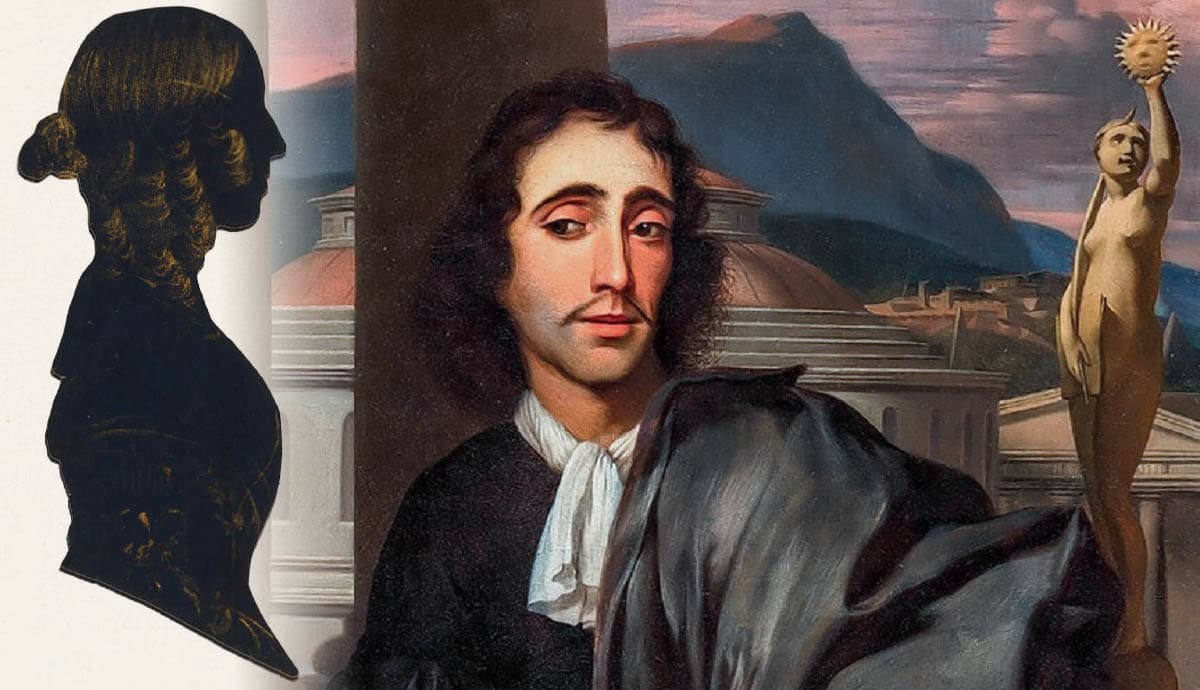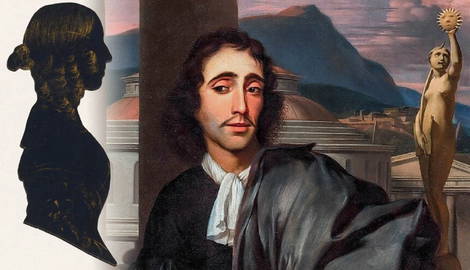
In her novels, Mary Ann Evans, better known under her pen name George Eliot (22 November 1819 – 22 December 1880) proves herself to be a keen observer of human emotion. She consistently invites us to understand her character’s feelings and actions in relation to their direct environment. While her unbridled feminine intuition and personal ambitions did contribute to her bold storytelling, her meticulous grasp of Baruch (de) Spinoza’s (24 November 1632 – 21 February 1677) controversial Ethics (1677) lies at the heart of her novels. Spinoza places the quest for freedom through human actions at the center of his philosophical exploration. According to the revolutionary thinker, actions and emotions fuel our understanding of ourselves and nurture our quest for freedom. But how does George Eliot bring this to life?
George Eliot Translates Ethics: Our Path to the Substance

“What is wanted in English is not a translation of Spinoza’s works, but a true estimate of his life and system…”
George Eliot’s states in a letter to Charles Bray after abandoning her translation of Spinoza’s Theologico-Political Treatise. She continues:
“One feels that there is another yet more difficult process of translation for the reader to effect, and that the only mode of making Spinoza accessible to a larger number is to study his books, then shut them, and give an analysis.”
Eliot never did produce an analysis of Spinoza’s Theologico-Political Treatise. A few years later, she would start working on a translation project that would define her work as an author. The astute analyses she wanted to provide the general public on Spinoza’s philosophy found their way into her novels.
George Eliot is often lauded as a defining author of her time, but she deserves more recognition for her accomplishments as a philosopher and translator. At the age of 19, the young Eliot immersed herself in a profound study of Latin, metaphysics, and geometry. Although she didn’t realize it at the time, these skills would prove to be instrumental in her translation of Baruch Spinoza’s Ethics, a controversial masterpiece that had found its way on the “banned books list”.

In his Ethics, Spinoza famously rejects the notion of free will. He explains that living a moral life does not guarantee freedom, but instead, freedom is our goal and something we must struggle to achieve. According to the philosopher, we live in a determined state where humans are not substances, but only God is substance. Everything else, including us, is a mode of this substance, which makes individuality, autonomy, and indeed free will, an illusion.
But Spinoza emphasizes that we are still self-conscious beings and experience internal fluctuations as a result. When we do good deeds or experience love and fulfillment, we are strengthening our mental capacities. When we exercise regularly and follow a healthy diet, we are strengthening our physical being. It is in these actions we take that our journey to freedom takes form. In Spinoza’s words, “the more [a being] acts the more perfect it is.”

No matter how focused or strategic our actions, we will still be determined by our direct environment, the people we engage with, and the society we live in. Spinoza clarifies, as translated by Eliot:
“We can never bring ourselves to a state in which we should want nothing external in order to preserve our existence, or so live as to have no commerce with things outside ourselves.”
In her work, George Eliot’s characters undertake certain actions to achieve freedom, and they suffer the direct influence of their often-destructive environment. Eliot understood that the quest for freedom is affected by the external aggressors that can make the struggle greater. In Middlemarch, she writes:
“There is no creature whose inward being is so strong that it is not greatly determined by what lies outside it.”
How Can We Become Free? Eliot and the Quest for Spinoza’s Elusive Freedom

In her fiction, George Eliot applies Spinoza’s philosophy to the drama of Victorian life. Her characters struggle to cultivate freedom and live life on their own terms. “Living the good life”, as conventional Christian morality often teaches us, is seen as more of an exercise in enlightenment than a final goal. And it is in these notions of freedom and morality that George Eliot poses the most profound questions: how can we strengthen our physical and mental capacities and find that power, if we are all shaped by the society we live in and the company we keep?
Society plays a great part in Eliot’s work, especially in how it treats her heroines. Maggie Tulliver in The Mill on the Floss and Dorothea Brooke in Middlemarch do not belong in their time. Their desires break away from conventions and, as a result, this forces them to examine their emotions and question their identity as women.

In a striking example of art imitating life, George Eliot had already applied her story arc to herself. While working on the translation of Spinoza’s Ethics, Eliot challenged societal conventions by “living in sin” with George Henry Lewes. She refused to commit entirely to the critic and philosopher and agreed to have an “open marriage”. While never formally married, they lived together as soulmates, and their relationship nourished their respective careers.
Spinoza’s philosophy and Eliot’s own defiance against conventional female roles gave birth to iconic yet tragic heroines, who challenge the rules of the Victorian age.
What is the Cost of the Pursuit of Freedom for George Eliot’s Heroines?

Nineteenth-century society wasn’t kind to its women, and George Eliot’s heroines suffer under the constraints of society. We follow her characters as they wade through intricate systems and complex relationships. But beyond the frenzy of human error, we also see characters gaining a deeper level of understanding.
On the road to this hard-gained self-knowledge, Eliot puts her characters through a lot. In The Mill on the Floss, Maggie practices self-harm and finds herself in a sadomasochistic relationship with her brother, Tom. This pattern of self-abuse and sorrow is established early on in the story. In the memorable opening sequence from her childhood, Maggie cuts off her hair. She takes great pleasure in her altered appearance, until Tom mocks her and shames her. He forces her to see herself through the eyes of one of the most important men in her life.

Women who resort to self-harm and are forced into self-reflection on a man’s terms is a common literary theme in nineteenth-century novels. Before the woman can disregard conventional society, she must first resent herself for being a woman. Since the 1970s, George Eliot has often been criticized for not creating more enlightened lives for her heroines. Others, however, understood that Eliot was marking a sharp commentary on her time, while also breathing life into Spinoza’s concept of the struggle for freedom, and how the very actions that mark our character are the essence of that freedom. In her article Maggie Tulliver’s Long Suicide, Elizabeth Ermarth remarks that “Maggie is strong enough to be suffocated by her narrow life, but not strong enough to escape it”. Here, again, we see the tension between the “inward being” and the “outside world” Eliot commonly explores.
Maggie grows up, but the sadness of her childhood is still with her. When she has to choose between marriage to charming Stephen Guest and returning home, she chooses the latter. In a twisted sense of resolve and reconciliation, Maggie and Tom die tragically when their boat capsizes, and drown in an embrace with the accompanying epigraph “In their death they were not divided.”

In Middlemarch, the ambitious Dorothea wants to leave her mark on the world and longs for an epic life akin to that of Saint Theresa. Part of her understands that marriage is the way for a woman to secure her future. But Dorothea, not your ordinary Victorian heroine, has a thirst for knowledge. She hopes that by choosing a rather unconventional husband, she will achieve some of her own personal goals. While being courted by a perfectly respectable landowner, she chooses to marry Mr. Casaubon, a scholar more than 20 years her senior. Dorothea imagines that when married to Casaubon she will learn ancient languages, support her husband in achieving greatness, and become something of a scholar herself.
“I should learn everything then, she said to herself, still walking quickly along the bridle road through the wood. It would be my duty to study that I might help him the better in his great works. There would be nothing trivial about our lives. Everyday-things with us would mean the greatest things.”
Unfortunately, Casaubon has no intention of nurturing his young bride. Instead, his loveless and dry character crushes Dorothea’s ambition and passion. Dorothea’s ideals of Christian moral and humility bind her to Casaubon who only occupies her with menial secretarial work.

Contrary to iconic literary predecessors such as Jane Austen, Eliot doesn’t treat marriage as an effect of the story. Dorothea and Casaubon marry in chapter 10 when 70 more chapters remain, which makes marriage and all its complexities the subject in which Dorothea takes a series of actions that lead to deeper understanding and a creation of Spinoza’s “more perfect beings”.
During her marriage, she develops a friendship with Casaubon’s idealistic cousin Will Ladislaw, which, despite Dorothea’s devotion, makes the aging scholar suspicious. After Casaubon’s death, Dorothea remains loyal to her late husband and continues his work. However, when she learns about a clause Casaubon had put in his will that forbids her to marry Ladislaw, she forfeits her devotion and returns to her more complex and independent self.

Due to the threat of disinheritance and the fear of creating a scandal, Dorothea initially keeps Ladislaw at arm’s length. True to form, Eliot allows this great life change to resonate within the even greater inner journey that Dorothea is about to complete. Claire Thomas explains:
“The self-protective blindness required by Dorothea during her first marriage is no longer necessary after she is widowed. Her vision is realigned and refocused onto a smaller life and the simpler, picturesque man. With Will Ladislaw, her worldview is narrower and less vulnerable to the debilitating impact of grand visions wholly transmuted.”

Dorothea and Ladislaw fall in love and get married. With Ladislaw, Dorothea experiences a more mature and balanced marriage. She never regretted the loss of her inheritance because she and Ladislaw “…were bound to each other by a love stronger than any impulses which could have marred it. No life would have been possible to Dorothea which was not filled with emotion, and she had now a life filled also with a beneficent activity which she had not the doubtful pains of discovering and marking out for herself.“
Rather than being passive women, Eliot’s heroines act and wade through the maelstrom of Victorian society. And even when the external influences push and derail them from a path to freedom, their actions turn them into more complete and “more perfect” human beings.








